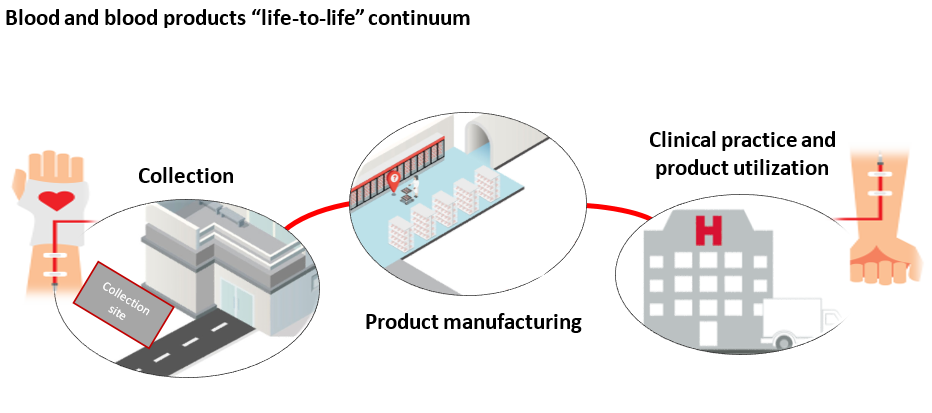Funding research to improve utilization: Blood Efficiency Accelerator Award Program

In 2017, the Centre for Innovation established a new research funding program – the Blood Efficiency Accelerator Award Program or “BEAP”. The BEAP funds research to improve the efficient and appropriate use of blood and blood products.
Quick Facts:
- BEAP was established in 2017 to support research projects that can improve the efficient and appropriate utilization of blood products, while maintaining the safety of the blood system
- Applicants to BEAP must be affiliated with Canadian Blood Services or a Canadian academic program as a faculty member
- All BEAP project teams must include one Canadian Blood Services employee
- BEAP projects may be supported up to a maximum of $30,000 for one year
Why is improving the efficient and appropriate use of blood and blood products important?
The use of blood and blood products is a very common and often life-saving medical intervention. However, blood and blood products are a limited resource and can sometimes be scarce. As with any medical intervention, choosing to administer blood or blood products also involves weighing benefit to the patient against any potential risks. To maximize the benefit of blood and blood products, while ensuring patient safety, it is important to ensure blood and blood products are used correctly and appropriately.
Appropriate and efficient use of blood and blood products doesn’t just happen at the hospital bedside. The collaborative research projects supported by the BEAP may result in changes at Canadian Blood Services or Canadian hospitals at any point in the “life-to-life” continuum. That is, at any point from blood collection, to manufacturing of blood products, distribution of blood products, blood banking, and use at the hospital.
“I am proud that we are able to support the health system by facilitating research on utilization through the Blood Efficiency Accelerator Award Program. This program underscores Canadian Blood Services’ commitment to a sustainable and progressive system that ensures a safe and effective blood supply for all Canadians”, says Dr. Chantale Pambrun, director of the Centre for Innovation at Canadian Blood Services.

Since the BEAP was launched, four projects have been funded. These projects address issues ranging from product quality to clinical utilization.
A team led by Dr. William Sheffield, associate director, research, at the Centre for Innovation is examining the possibility that two technologies – pathogen inactivation and red cell rejuvenation – can be combined to improve red blood cell product safety and efficacy. Dr. Maria Fernandes, associate professor at Université Laval, is leading a project team that includes investigators from Canadian Blood Services and Héma-Québec. Their project will assess the quality of granulocyte concentrates, a blood product collected and manufactured by Héma-Québec, to optimize their use in transfusion therapy.
Dr. Jason Acker, senior scientist at the Centre for Innovation, and project team members are investigating a non-invasive prenatal genetic test to determine the compatibility of maternal blood with the fetus’s blood. Dr. Guillaume Martel, assistant professor at University of Ottawa, is leading a project team that is examining current transfusion practices in liver surgery patients at The Ottawa Hospital. Their aim is to develop educational initiatives to reduce inappropriate transfusions.
Interested in applying for funding?
If you have a project idea and are affiliated with a Canadian academic institution as a faculty member or with Canadian Blood Services, you are eligible to apply for funding through the BEAP. Project teams can be any size; however, at least one team member must be a Canadian Blood Services employee.
Our 2019 competition opens today and applications must be submitted by January 15, 2019. If you are interested in applying, click here for more information. If you have any questions or need help identifying a team member from Canadian Blood Services, contact the Centre for Innovation by email at centreforinnovation@blood.ca.
Subscribe to the Research & Education Round Up to stay up to date on research publications and funding opportunities.
Canadian Blood Services – Driving world-class innovation
Through discovery, development and applied research, Canadian Blood Services drives world-class innovation in blood transfusion, cellular therapy and transplantation—bringing clarity and insight to an increasingly complex healthcare future. Our dedicated research team and extended network of partners engage in exploratory and applied research to create new knowledge, inform and enhance best practices, contribute to the development of new services and technologies, and build capacity through training and collaboration. Find out more about our research impact.
The opinions reflected in this post are those of the author and do not necessarily reflect the opinions of Canadian Blood Services nor do they reflect the views of Health Canada or any other funding agency.